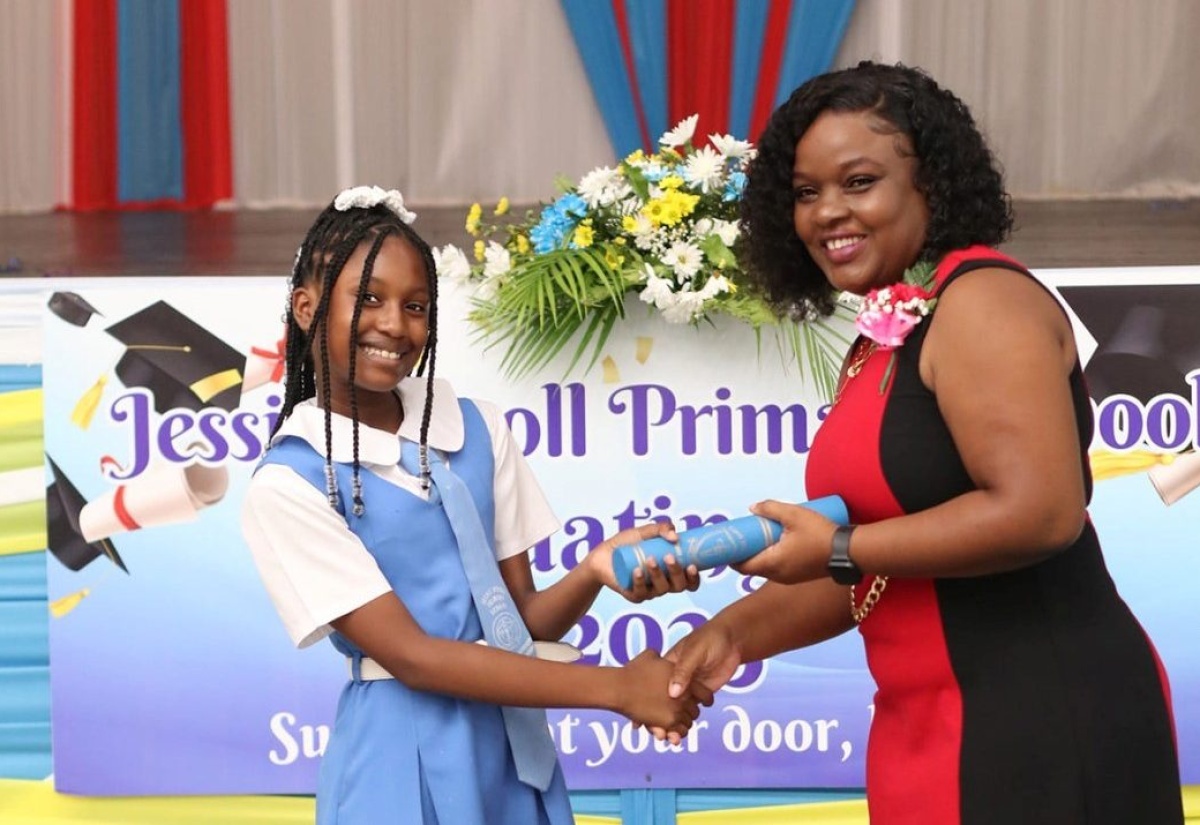Primary Student Bounces Back to Gain School of Choice
By: , September 5, 2023The Full Story
Online learning, resulting from the coronavirus (COVID-19) pandemic, did not find favour with Kaylei Riley, but the Jessie Ripoll Primary School student is now beaming after she achieved high proficiency levels in Mathematics and Science.
Her success in the Primary Exit Profile (PEP) examination came from a special intervention instituted by the school’s administrators, which included deployment of specialist teachers and involvement of parents, through the institution’s Parent-Teacher Association (PTA) Education Committee.
Kaylei shares with JIS News that during the period when classes were held online, and the “teachers were not looking, I played games”.
With the resumption of face-to-face classes, she and other students were assessed as being behind in their learning, so her grade-five teacher, Daneile Powell, a Maths specialist, intervened.
“She took me all the way to the top, and I am grateful to her,” Kaylei tells JIS News.
She says when the teachers were announcing the placement of students, she could not wait, so she asked where she was going, and the good news came that she was going to Wolmer’s Girls’ School.
“I screamed out loud. I am excited and proud, because Maths was not my best subject, and I know I can make a career out of Maths,” she says.
Kaylei has her eyes set on medicine or robotics. She is thankful to her father, Akeem Mullings, for his help with Maths, and her mother, Dania Barrett, for support and motivation.
Miss Barrett is heaping praises on the teacher, stating that she was very alert to notice that her daughter needed special attention and made herself available for extra classes seven days each week leading up to preparation and sitting of the PEP examinations.
“She is a very dedicated teacher. She told us that she saw something in my daughter, and she was adamant in pulling it out. I am grateful for the teacher, because I don’t believe we could have gotten those scores without her,” Miss Barrett says.
For Principal of the school, Oneil Stephens, the students did “extremely well”, with 91 per cent of them getting their school of choice, because “our teachers continue to try with the students, despite the post-COVID-19 experience, focusing on critical thinking”.
He tells JIS News that last year they had serious concerns with performance levels in Mathematics and Science, but this year they are “two of our strongest areas. That augurs well for the interventions that we put in place”.

The Ministry of Education and Youth reported that students who sat PEP exams delivered “encouraging results” for Mathematics, Science and Language Arts, with 50 per cent of them being categorised as ‘proficient’ or ‘highly proficient’ in all four subject areas (Mathematics, Language Arts, Science and Social Studies).
In Maths, 45.9 per cent of students were declared ‘proficient’ and 4.9 per cent ‘highly proficient’.
On the other hand, 43.5 per cent of students fell in the ‘developing’ category and 5.7 per cent in the ‘beginning’ category.
The ‘developing’ category means that students demonstrated partial evidence of the required competence, while the ‘beginning’ category means that the students demonstrated limited or no evidence of the required competence.
Less than six per cent of all students are in the ‘beginning’ category.
The main objective of PEP is to enhance the academic and critical thinking capabilities and creativity of students by the end of primary-level education.
It commences with a series of assessments at grade four and ends in grade six.
The three main categories are Performance Task, Ability Test, and Curriculum Test.
The Ministry’s data show that in the 2023 sitting, girls outperformed boys in Mathematics and Language Arts, and boys achieved higher scores in Science and Social Studies.
A total of 18,451 males and 17,653 females sat this year’s PEP.
Administering of the PEP examinations commenced in the 2018/2019 academic year, and due to issues with the COVID-19 pandemic, the Ministry had to modify the sittings in 2020, 2021, and 2022.
For the first time, they can fully compare this year’s results with that of 2019.




